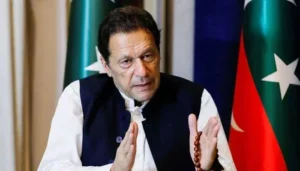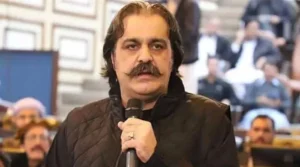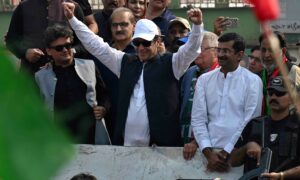Former Prime Minister and Pakistan Tehreek-e-Insaf (PTI) chairman Imran Khan has reportedly stated that the “doors to the establishment were never shut,” signaling a potential shift in tone amid prolonged political tension. According to senior PTI sources, Khan made the remarks during closed-door conversations, suggesting a possible openness to dialogue with the country’s powerful military establishment. This statement has sparked speculation about whether PTI is recalibrating its approach amid growing legal challenges and political isolation.
PTI insiders urge party members to remain united and avoid confrontational rhetoric that could further alienate key state institutions. The leadership has emphasized the importance of focusing on elections, legal strategies, and restoring political credibility. While no formal talks have been confirmed, the statement is seen as a strategic olive branch, hinting at PTI’s willingness to resolve disputes through dialogue rather than confrontation.
This development comes as Imran Khan remains incarcerated and PTI grapples with internal divisions, court cases, and increasing government pressure. Sources say party unity and diplomacy are now the priority.
Background: Imran Khan’s Relationship with the Establishment
Imran Khan’s political journey has been characterized by both alignment and confrontation with Pakistan’s military establishment. Initially, Khan’s rise to power was seen as a result of support from the military, a relationship that many believe contributed to PTI’s success in the 2018 general elections. However, his tenure as Prime Minister was marked by tensions with key military leaders, particularly over issues such as foreign policy, internal governance, and military influence over civilian affairs.

This complicated dynamic took a dramatic turn in 2022 when Khan was ousted from power through a no-confidence motion, which he and his supporters alleged was orchestrated by the establishment. Since then, Khan and PTI have adopted a vocal opposition stance, with his rhetoric often pointing to the influence of military leadership over the country’s political landscape.
Imran Khan’s Recent Statements: A Shift in Tone
Imran Khan’s most recent comments regarding the establishment show a shift in tone. The statement, “The doors to the establishment have never been shut,” suggests a potential for dialogue and engagement, which contrasts with the more antagonistic rhetoric that has dominated his recent public appearances.
Khan’s remarks came at a time when PTI, under his leadership, has been facing immense political pressure, including the imprisonment of several key party leaders and the challenges of running a nationwide political campaign without the government apparatus. The former Prime Minister’s claim is likely a signal that PTI, despite its recent confrontations, is willing to reconsider its approach to dealing with Pakistan’s military leadership.
PTI Sources Urge for Engagement with Establishment
In the aftermath of Imran Khan’s statement, PTI sources have urged the party leadership to explore new avenues for strategic engagement with the establishment. These sources argue that a pragmatic approach could help stabilize PTI’s position and pave the way for a return to power, especially in the face of mounting challenges from political rivals and an unstable economy.
The call for engagement is rooted in a broader understanding of Pakistan’s political system, where the military has long been a key player in shaping policy decisions, both domestic and foreign. PTI sources suggest that despite the tensions, it is essential for PTI to engage with the military to secure a favorable political environment. This approach also acknowledges the central role that the military plays in determining the country’s political future.
The Role of the Military in Pakistan’s Politics
Pakistan’s military has historically wielded significant power in the country’s political landscape, often playing a decisive role in shaping the direction of national politics. Military coups, intervention in civilian governance, and the establishment’s influence in foreign policy are well-documented aspects of Pakistan’s political history.

Given this context, Imran Khan’s attempt to reframe his relationship with the establishment is not merely a political maneuver but a reflection of the more significant power dynamics in Pakistan. The military has historically maintained a delicate balance between supporting civilian governments that align with its interests and exerting influence when necessary to protect national security or strategic priorities.
Strategic Engagement: What Does It Mean for PTI?
Strategic engagement with the establishment could take various forms. For PTI, this might involve renewed discussions with military leaders on governance reforms, economic policy, and national security. It may also involve subtle policy shifts to align more closely with the military’s priorities, such as foreign policy alignment, military spending, and counterterrorism measures.
However, this approach is not without its risks. PTI’s base, which has rallied around the party’s anti-establishment narrative, may view any shift towards engagement as a betrayal of the principles that made PTI a political force to reckon with. Furthermore, there are concerns that such a move could undermine PTI’s stance on civilian supremacy and democratic processes.
Challenges Facing PTI’s Leadership
Imran Khan’s political leadership is facing significant challenges. Following his ouster from office, PTI has struggled to maintain its momentum and unify its rank and file. The party has faced defections, internal divisions, and legal hurdles, including court cases against its leadership.

These challenges have prompted many PTI members to reconsider the party’s approach to governance and political engagement. The call for strategic engagement with the establishment could be seen as an attempt to stabilize PTI in a volatile political environment. By seeking to repair relations with powerful institutions, PTI could strengthen its position in the face of political opponents and restore its influence.
Political Ramifications of PTI’s Engagement with the Establishment
The political implications of PTI’s potential engagement with the military are far-reaching. On one hand, it could result in a more stable political climate, with PTI gaining the support it needs to return to power in the next elections. On the other hand, such a shift could alienate parts of the party’s base, who may perceive this as compromising PTI’s commitment to democratic values and civilian rule.
It could also impact the broader political landscape in Pakistan, as other political parties might recalibrate their strategies in response to this change in PTI’s approach. If PTI can successfully re-establish its position within Pakistan’s political establishment, it could lead to new alliances, power dynamics, and electoral strategies in the run-up to future elections.
Frequently Asked Questions
What did Imran Khan reportedly say about the establishment?
He stated that the “doors to the establishment were never shut.”
What does this statement suggest?
It indicates potential openness to dialogue or reconciliation with the military establishment.
Was the statement made publicly?
No, it was reportedly shared in private discussions, according to PTI sources.
Why is this significant now?
PTI is facing political pressure and legal troubles and seeks to re-engage strategically.
Is PTI in direct talks with the establishment?
No formal dialogue has been confirmed, but the tone suggests openness to talks.
What are PTI leaders advising members to do?
PTI sources are urging unity, discipline, and reduced confrontational rhetoric.
Is Imran Khan still in prison?
Yes, Imran Khan remains incarcerated on multiple legal charges.
How are internal divisions affecting PTI?
Factionalism and uncertainty have weakened PTI’s political cohesion and strategy.
What is PTI’s immediate focus?
Upcoming elections, legal defense, and restoring political stability.
How has the public reacted to this development?
Reactions are mixed—some see it as pragmatic, while others fear a softening of PTI’s stance.
Conclusion
Imran Khan’s remark about open channels with the establishment marks a notable pivot in PTI’s narrative, hinting at strategic recalibration amid adversity. As legal challenges mount and internal divisions threaten the party’s strength, senior leaders now emphasize unity, restraint, and political maturity. Whether this shift results in formal dialogue or political gains remains to be seen, but it signals a possible move from confrontation toward negotiation. PTI’s ability to stay cohesive, responsive, and forward-looking will determine its relevance in the coming political landscape. For now, the message from party insiders is clear: focus on strategy, support leadership, and prepare for the path ahead—whether through the ballot or the bargaining table.

